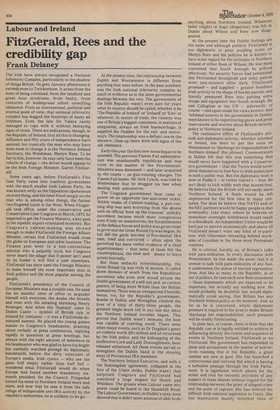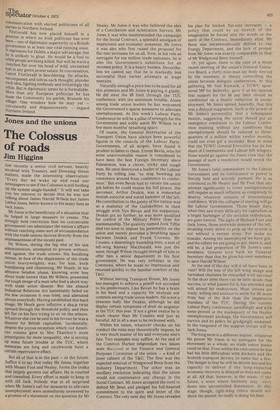Labour and Ireland
FitzGerald, Rees and the
credibilitygap
Frank Delaney
The Irish have always recognised a National Inferiority Complex, particularly in the shadow of things British. On grey January afternoons it extends even to Twickenham. It arises from the state of being colonised, from the landlord and great hour syndrome, from fealty, from centuries of widespread albiet unwilling obeisance. From an international, political and internal point of view, that national inferiority complex has dogged the footsteps of many an Irishman. Even the late De Valera rarely managed to cope with it without betraying signs of stress. There are indications, though, in the Republic of Ireland, that all this is changing. Affluence and fifty years of independence have assisted, but ironically the man who may have done most to change it is the Northern Ireland Secretary, the Welshman, Merlyn Rees. To be fair to him, however, he may only have been the vehicle of change — the driver would appear to be the Irish Foreign Minister, Garret FitzGerald.
Some years ago, before FitzGerald's Fine Gael Party came into coalition government with the much smaller Irish Labour Party, he was known wrily as the Opposition spokesman on everything, and the label fitted snugly on the man who is, among other things, the fastest two-fingered typist in the West. When Fitzgerald took office, under the conservative and Conservative Liam Cosgrave in March, 1973, he expected to get the Finance Ministry, a key post in the republic export-orientated economy. But Cosgrave's cabinet-making was shrewd enough to make FitzGerald the Foreign Affairs Minister, certain that FitzGerlad would cross the globe on European and other business. The Finance post went to a non-contentious solicitor who is palpably loyal, but Cosgrave never heard the adage that if power isn't used by its holder it will find a user elsewhere. FitzGerald has since used the Foreign Ministry to make himself the most important man in Irish politics and the most popular among the people.
FitzGerald's presidency of the Council of European Ministers was a notable one. He used the six months' term of office to acquaint himself with everyone, the Arabs, the Israelis and even with the amazing shrinking Henry Kissinger. And when the 'Summit' came to Dublin Castle — symbol of British rule in Ireland for centuries — it was a FitzGerald-dominated summit. He played the young games master to Cosgrave's headmaster, prancing about verbally at press conferences, replying rapidly to questions at press briefings, but always with the right amount of deference to his headmaster who was glad to have his bright but carefully watched protege do diplomatic handstands before the dirty raincoats of Europe's media. Irish cynics — who see the glass half empty rather than half full — wondered what FitzGerald would do when Europe had found another mandatory sixmonth president for the Council. Fitzgerlad turned his mind to Northern Ireland more and more, and now that he sees it from the safe refuge of indisputable anti-IRA activity by the republic's authorities, he is unlikely to let go. At the present time, the relationship between Dublin and Westminster is different from anything that went before. In the past nowhere was the Irish national inferiority complex as much in evidence as in the inter-governmental dealings between the two. The government of the Irish Republic wasn't even sure for years what its country should be called, whether it be 'The Republic of Ireland' or 'Ireland' or 'Eire' or whatever. In matter of trade, the country was one of Britain's biggest customers, in matters of emigration, always an Irish haemorrhage, it supplied the Paddies for the railand motorways. The relationship was a defiant one in the distance; close-up there were still signs of the old obeisance.
Early this year the first new notes began to be sounded. The previous Fianna Fail administration was unashamedly republican and was riven in the matter of the Provisionals. Ministers were dismissed — and later acquitted by the courts — on gun-running charges. The Fianna Fail leader, Mr Jack Lynch, was told by Westminster that he dragged his feet when dealing with subversives.
The Cosgrave government then came to power on an opportune law-and-order ticket. Within weeks of Cabinet-making, a gun-running ship was sent scurrying from the shores with an official 'boot up the transom', military movement became much more conspicuous even if only on manoeuvres, the Establishment of the defence forces and police was given room to grow and the Great Round Up was begun. So full did the gaols become of Provisional IRA men, tried and convicted — often upon the permitted but mere verbal evidence of a chief superintendent — that some of them felt the claustrophobia, the heat and desire to leave prison hurriedly.
But these setbacks notwithstanding, the Great Round Up was truly in motion. It called down showers of wrath from the Republican movement who even now would accuse the Dublin government of a sell-out and, on current posters, of being more British than the British themselves. There was an unexpected if horrific bonus, too, for the Republic's government. Bombs in Dublin and Monaghan claimed the lives of a total of thirty-three people, the greatest single death toll in any one day since the Northern Ireland troubles began. This proved that Dublin wasn't immune, the best was capable of crawling south. There were other major events, such as Dr Dugdale's great art robbery worth E81/2 million and all recovered by the Irish police, and the kidnapping of the inoffensive Lord and Lady Donoughmore, later released unharmed. All these events served to strengthen the Dublin hand in the stowing away of Provisional IRA members.
The Northern Ireland Executive, and with it the Sunningdale agreement, collapsed in the face of the Ulster strike. Dublin wasn't that surprised. Cosgrave and FitzGerald had conceived a large respect for Heath and Whitelaw. The groans when Labour came into power could be heard in the Shankhill Road. The Labour Government, in Dublin's eyes, soon showed that it didn't seem anxious or able to do anything about Northern Ireland. Whatever belief (slight) or hope (desperate) was felt in Dublin about Wilson and Rees now disappeared.
At the present time the Dublin feelings are the same and although publicly FitzGerald IS too diplomatic to pour scalding scorn on Merlyn Rees and his policies he is known to have scant regard for the attitudes in Northern Ireland of either Rees or Wilson. He was most concerned that South Armagh be policed effectively. No security forces had penetrated this Provisional stronghold and army patrols were non-existent after dark. FitzGerald promised — and supplied — greater Southern Irish activity in the shape of border patrols, and literally pressured Rees into putting extra troops and equipment into South Armagh. He met Callaghan at the UN — informally, of course — and again made his views known. And 'informal sources in the government in Dublin were known to be experiencing grave and great reservations and worries about British security policy in Northern Ireland. The cumulative effect of FitzGerald's attitude and diplomatic activity, whether informal or formal, has been to put the onus on Westminster to 'discharge its responsibilities in Northern Ireland' (his phrase). Commentators in Dublin felt that this was something that would never have happened with a Conservative government — that the Tories would never allow themselves to lose face to Irish politicians in such a public way. But the diplomatic boot is now on Paddy's — or rather Garret's — foot. He isn't likely to kick wildly with that booted foot. He believes that the British will not easily leave Northern Ireland. A flank would be left unprotected for the first time in many centuries. Nor does he believe that NATO and/or the EEC partners would be happy people in that eventuality. Like many others he believes an immediate overnight withdrawal would result in a bloodbath. An independent Ulster would be hard put to survive economically and above all FitzGerald doesn't want any kind of re-partition, with Ulstermen retreating behind stockades of Loyalism in the three most Protestant counties.
He is criticial, harshly so, of Britain's talks with para-militaries. In every discussion with Westminster, he has made the point that it is unwise to talk with para-militaries of any hue, it undermines the status of elected representatives. And like so many in the Republic, in or out of politics, he rues each new Rees statement — those statements which are expected to be important, but actually say nothing new. He would probably be doubtful, but would diplomatically avoid saying, that Britain has any Northern Ireland policy at the moment. And, as far as he is concerned, where diplomatic pressure is required in his eyes to make Britain 'discharge her responsibilities', such pressure will be readily forthcoming.
In plain fact, of course, there is little that the Republic can or is legally entitled to achieve in influencing directly the course and sequence of events in Northern Ireland, FitzGerald or no FitzGerald. Her government has responded to pleas and accusations in the matter of subvernives roaming free in the Republic, a great sumber are now in gaol. She has launched a controversial anti-terrorist Bill which is having a turbulent passage through the Irish Parliament. It is legislation which allows for the arrest and trial for terrorist activities of any suspect in these islands without regard for the relationship between the point of alleged crime and the point of capture. She has shelved the difficult Irish national aspiration to Unity. She has maintained mainly informal lines of communication with elected politicians of all parties in Northern Ireland. FitzGerald has • now placed himself in a position in which no Irish politician has ever been — one of diplomatic superiority to a British government in at least one vital running issue. It represents for Dublin a major advantage, but he is unlikely to gloat. He would be a fool to While people are being killed. Nor will he wave a clenched fist over his head of wild, uncombed hair in any green power salute. In conversation, Garret FitzGerald is bewildering. He attacks, encompasses and solves each thought, plunder each idea, figeting endlessly and irritatingly the While. But in diplomatic terms he is formidable. More than any European politician he has made the Community his parish, Brussels his village. One wonders how he may yet — calculatedly and dispassionately — regard Northern Ireland.



































 Previous page
Previous page